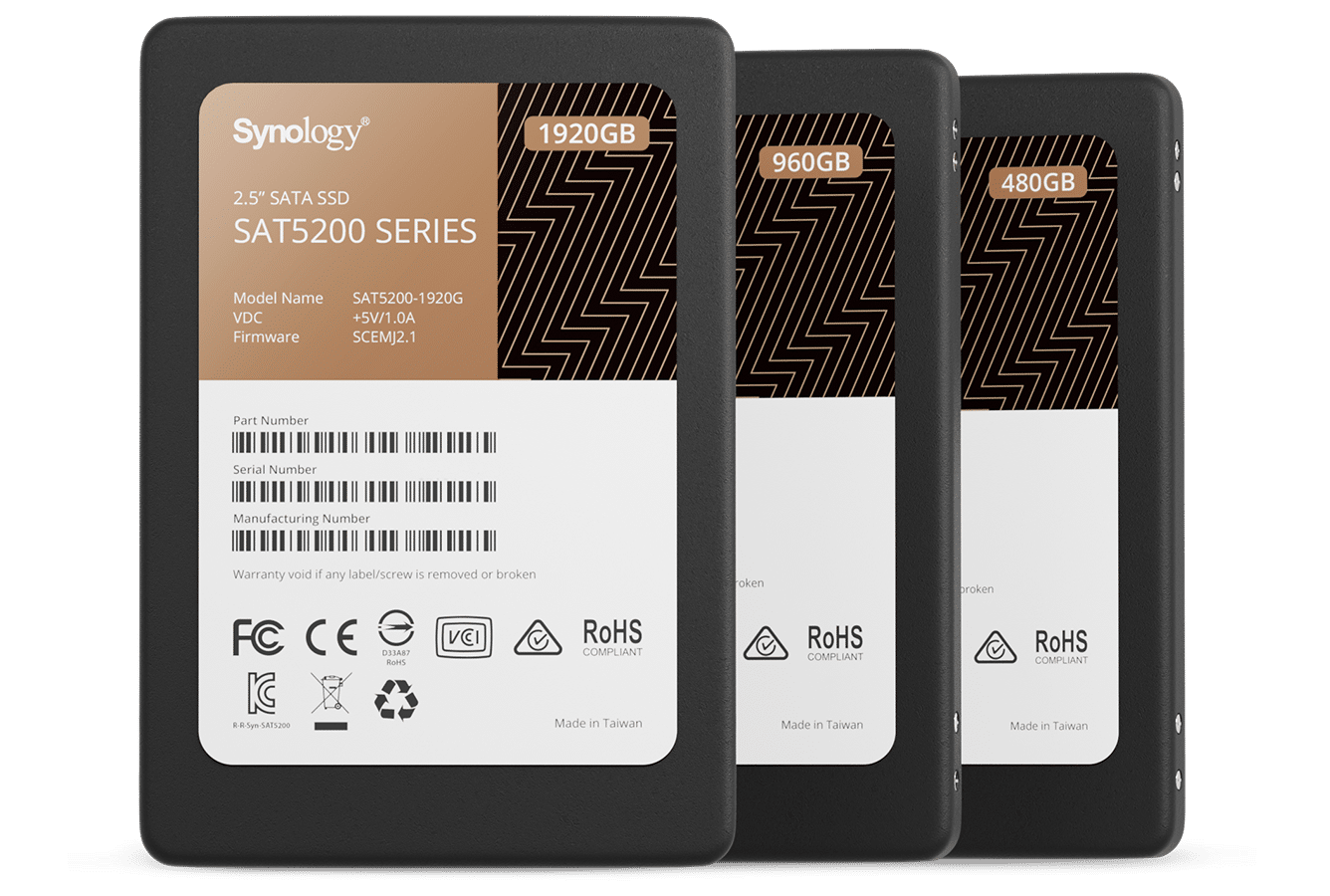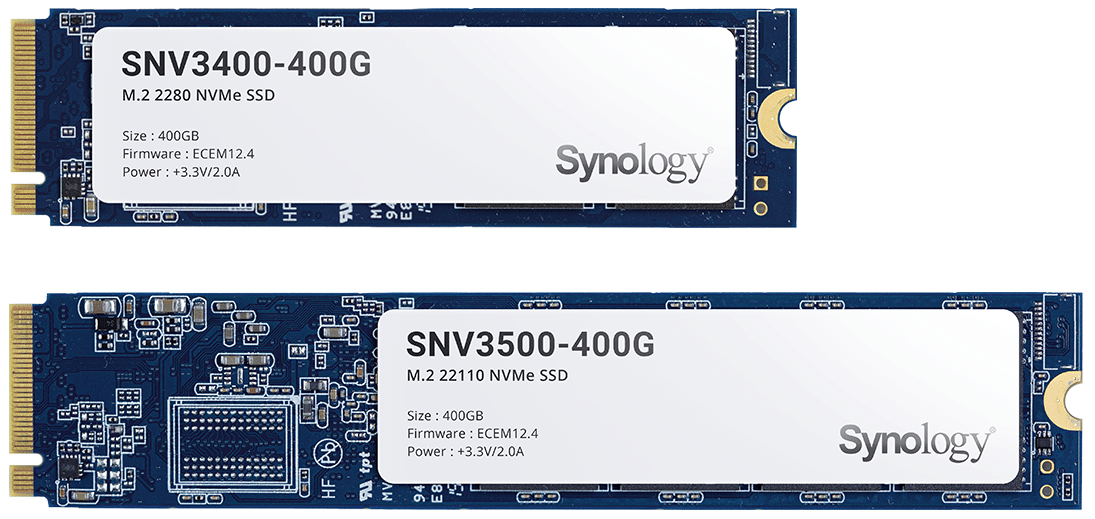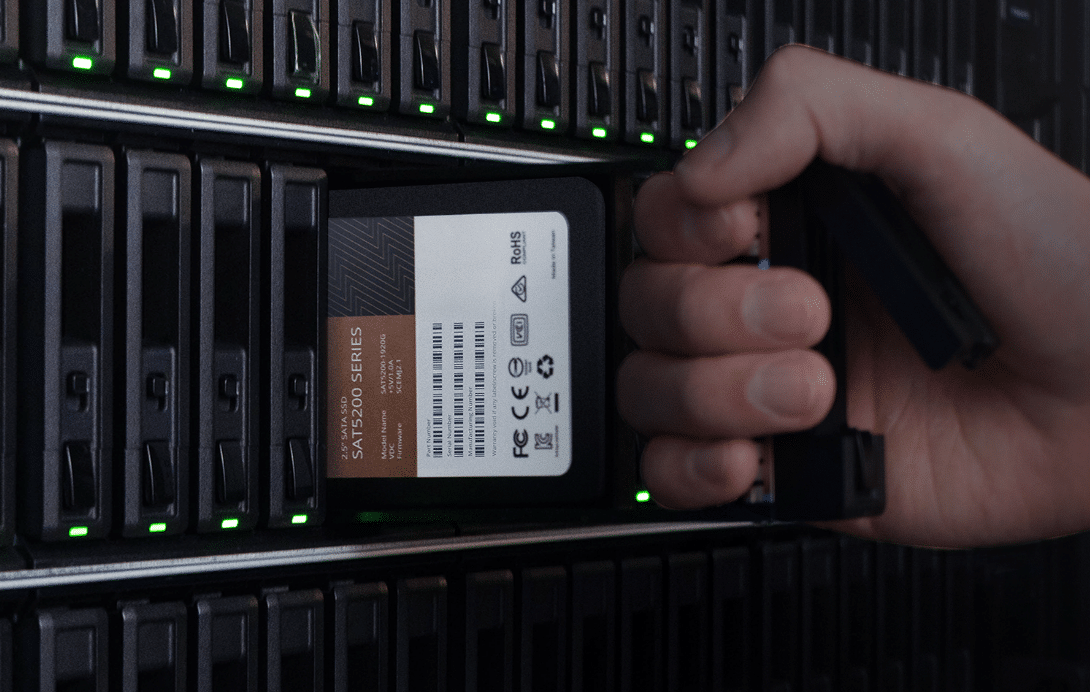Synology selling its own SSDs for some reason

Synology makes some great network-attached storage (NAS) enclosures. Whether for home or business, its devices can be filled with storage disks to set up collaborative file-sharing over a network. Synology's offerings are fast and dependable, making them smart choices for consumers. There's a reason so many people trust the brand.
The company's NAS products can work with any brand of storage disk, but still, Synology has decided to begin selling its own solid state drives for some reason. Yeah, it is kind of odd to see drives with Synology branding, but here we are. I suppose the company saw a money-making opportunity, so who can blame it for trying to increase profits. The company isn't just offering 2.5-inch SATA SSDs either, but M.2 PCIe-based drives too. Nice.
"Speed up workloads confidently with class-leading performance. SAT5200 delivers up to 98K/67K sustained 4K random read/write IOPS2 with minimal performance degradation across the lifespan of the drive. SAT5200 series includes power-loss protection and end-to-end data path protection for enhanced data durability, minimizing service disruptions due to data corruption. SAT5200 drives are rated for 1.3 Drive Writes Per Day (DWPD) under the JESD219A enterprise workload and are intended for mixed-usage deployments," says Synology.
ALSO READ: Seagate releases FireCuda 120 SATA SSD for gaming
The company also says, "Accelerate existing hard drive storage pools with SNV series NVMe SSD cache drives, optimized for low latency and random write performance. Synology's SNV series are built to be consistent, providing over 40K IOPS under sustained random write workloads. SNV3400 and SNV3500 are both rated for 0.68 DWPD under the JESD219A enterprise workload."
Synology shares some specifications below.
SATA-based drives
| SAT5200-480G | SAT5200-960G | SAT5200-1920G | ||
|---|---|---|---|---|
| General | Capacity | 480 GB | 960 GB | 1.92 TB |
| Form Factor | 2.5" 7mm | 2.5" 7mm | 2.5" 7mm | |
| Interface | SATA 6 Gb/s | SATA 6 Gb/s | SATA 6 Gb/s | |
| Performance | Sequential Read (128KB, QD32) | 530 MB/s | 530 MB/s | 530 MB/s |
| Sequential Write (128KB, QD32) | 500 MB/s | 500 MB/s | 500 MB/s | |
| Random Read (4KB, QD32) | 95,000 IOPS | 98,000 IOPS | 98,000 IOPS | |
| Random Write (4KB, QD32) | 55,000 IOPS | 67,000 IOPS | 60,000 IOPS | |
| Endurance and Reliability | Terabytes Written (TBW)* | 1145 TB | 2290 TB | 4581 TB |
| Drive Writes Per Day (DWPD) | 1.3 | 1.3 | 1.3 | |
| Mean Time Between Failures (MTBF) | 1.5 million hours | 1.5 million hours | 1.5 million hours | |
| Uncorrectable Bit Error Rate (UBER) | < 1 sector per 1017 bits read | < 1 sector per 1017 bits read | < 1 sector per 1017 bits read | |
| Power Loss Protection | ||||
| Warranty* | 5 Years | 5 Years | 5 Years | |
| Notes |
|
|||
| Power Consumption | Supply Voltage | 5V (± 10%) | 5V (± 10%) | 5V (± 10%) |
| Active Read (Typ.) | 2.6 W | 2.9 W | 3.1 W | |
| Active Write (Typ.) | 4.2 W | 4.6 W | 5.1 W | |
| Idle | 1.4 W | 1.5 W | 1.6 W | |
| Notes | Power consumption may differ according to configurations and platforms. | Power consumption may differ according to configurations and platforms. | Power consumption may differ according to configurations and platforms. | |
| Temperature | Operating Temperature | 0°C to 70°C (32°F to 158°F) | 0°C to 70°C (32°F to 158°F) | 0°C to 70°C (32°F to 158°F) |
| Storage Temperature | -40°C to 85°C (-40°F to 185°F) | -40°C to 85°C (-40°F to 185°F) | -40°C to 85°C (-40°F to 185°F) | |
| Others | Size (Height x Width x Depth) | 7 mm x 69.85 mm x 100 mm | 7 mm x 69.85 mm x 100 mm | 7 mm x 69.85 mm x 100 mm |
| Certification |
|
|||

PCIe-based drives
| SNV3400-400G | SNV3500-400G | ||
|---|---|---|---|
| General | Capacity | 400 GB | 400 GB |
| Form Factor | M.2 2280 | M.2 22110 | |
| Interface | NVMe PCIe 3.0 x4 | NVMe PCIe 3.0 x4 | |
| Performance | Sequential Read (128KB, QD32) | 3,100 MB/s | 3,100 MB/s |
| Sequential Write (128KB, QD32) | 550 MB/s | 550 MB/s | |
| Random Read (4KB, QD256) | 205,000 IOPS | 205,000 IOPS | |
| Random Write (4KB, QD256) | 40,000 IOPS | 40,000 IOPS | |
| Endurance and Reliability | Terabytes Written (TBW)* | 500 TB | 500 TB |
| Drive Writes Per Day (DWPD) | 0.68 | 0.68 | |
| Mean Time Between Failures (MTBF) | 1.8 million hours | 1.8 million hours | |
| Uncorrectable Bit Error Rate (UBER) | < 1 sector per 1017 bits read | < 1 sector per 1017 bits read | |
| Power Loss Protection | - | ||
| Warranty* | 5 Years | 5 Years | |
| Notes |
|
||
| Power Consumption | Supply Voltage | 3.3V (± 10%) | 3.3V (± 10%) |
| Active Read (Typ.) | 3.2 W | 3.7 W | |
| Active Write (Typ.) | 3.2 W | 3.4 W | |
| Idle | 2.0 W | 2.0 W | |
| Notes | Power consumption may differ according to configurations and platforms. | Power consumption may differ according to configurations and platforms. | |
| Temperature | Operating Temperature | 0°C to 70°C (32°F to 158°F) | 0°C to 70°C (32°F to 158°F) |
| Storage Temperature | -40°C to 85°C (-40°F to 185°F) | -40°C to 85°C (-40°F to 185°F) | |
| Others | Size (Height x Width x Depth) | 3.5 mm x 22 mm x 80 mm | 4.5 mm x 22 mm x 110 mm |
| Certification |
|
||

Michael Wang, Synology Product Manager, provides the following statement.
Data storage is a fundamental part of any business today, whether for on-premises or hybrid cloud infrastructure. Requirements for performance and low latency in modern deployments have shifted trends towards hybrid or all solid-state storage arrays. We have also seen SSD cache adoption increased by 2.4 times in 2019, and all-solid-state deployments have increased by 53 percent as well. Our customers have been demanding more reliable drives that can deliver consistent performance on our systems than what the market readily offers. We engineered our new products to exceed those demands by putting them through thousands of hours of validation and heavy stress tests on our systems.
Will consumers buy these Synology SSDs? That depends. The biggest factor will be price -- something the company has not yet revealed. If they cost more than similar drives from established storage brands like Samsung or Western Digital, consumers will likely pass. Also, we will have to see years of data regarding dependability and failure rates before serious data hoarders will trust them. Not to mention, it is not yet clear Synology is merely rebranding another company's drives or manufacturing the SSDs themselves. All questions should be answered once the drives hit retailers and land in the hands of reviewers.
